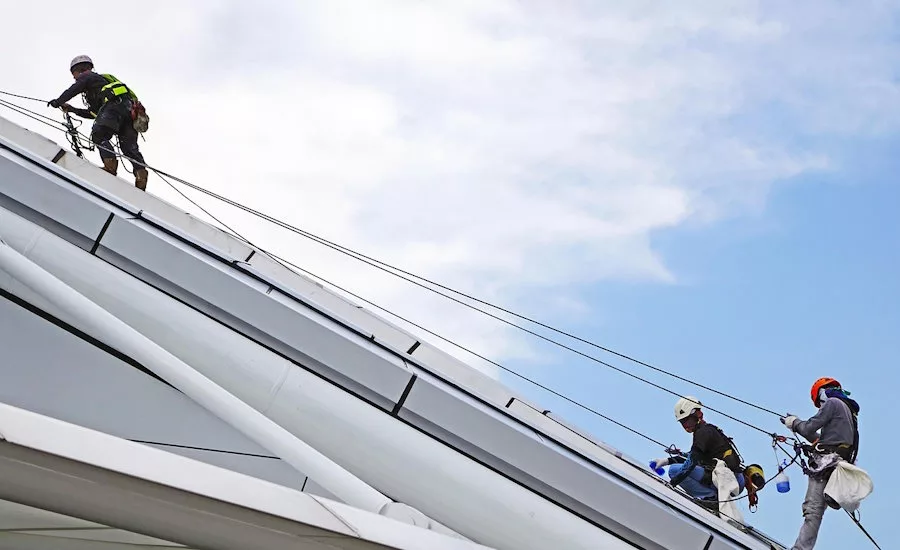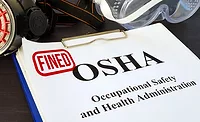Roofing Safety
Missouri Contractor Fined $290K After Teen Worker’s Fatal Fall
Tragedy highlights why fall protection and child labor compliance matter in roofing

The Department of Labor and a Missouri-based roofing contractor reached an agreement after an investigation determined the contractor’s actions led to a teen’s fatal fall in March 2023.
According to a news release from the Department of Labor, John Troyer — owner of Troyer Construction in Jamesport, Mo., operating as Troyer Roofing & Coatings — failed to provide workers with the required fall protection.
On March 27, 2023, an 18-year-old employee was applying sealant to a commercial building’s roof when he fell more than 22 feet, leaving him in a coma for five days before dying.
OSHA investigations determined that Troyer didn’t ensure employees were using fall protection and failed to train them on how to use it. The agency cited the company for similar fall protection violations in 2015.
“Troyer Roofing & Coatings could have prevented this young worker’s death by requiring their employees to use fall protection equipment,” said OSHA Area Director Karena Lorek in Kansas City, Mo., in a September 2023 news release. “Disturbingly, the employer allowed other workers to go back to work on the same roof without fall protection.”
Under the agreement, Troyer must pay $156,259 in OSHA penalties.
A separate investigation by the department’s Wage and Hour Division found Troyer violated the Fair Labor Standards Act by employing minors illegally in roofing work from May 2022 to June 2023.
In addition to the OSHA penalties, Troyer must pay $15,000 in child labor penalties and $118,741 in criminal fines to the U.S. Department of Justice. This totals $290,000 in penalties and fines. The company will enroll in Missouri’s On-Site Safety and Health Consultation Program.
When Fatal Falls Occur
Roofing is one of the top three deadliest civilian occupations, according to data from the Bureau of Labor Statistics. Of the 134 roofing fatalities that occurred in 2023, 110 of them, or 82%, were due to a fall, slip or trip. This is up 10% from 2022, when there were 100 fatal fall incidents.
Trent Cotney, partner at Adams and Reese LLP, said that should the worst-case scenario occur, contractors should have a standard operating procedure for when OSHA shows up at a job site. This can include:
- Conduct an internal investigation
- Document safety practices
- Prepare for the possibility of civilian claims
“It’s important that contractors tell the truth, cooperate with OSHA, but always know and assert their rights,” Cotney said. “A strong safety culture is not only a legal obligation — it’s essential to protecting your workers.”
Quick Read: 5 Takeaways
- A Missouri roofing contractor must pay $290,000 in penalties after an 18-year-old worker died from a 22-foot fall in 2023.
- OSHA cited the company for failing to provide fall protection and proper training — repeat violations dating back to 2015.
- The contractor also illegally employed minors in roofing work, violating federal child labor laws.
- Roofing remains one of the deadliest civilian jobs, with falls accounting for over 80% of industry fatalities in 2023.
- Experts stress the need for safety protocols, documented training, and legal compliance to protect workers and avoid liability.
Child Labor Laws
Given the dangerous nature of roofing, federal law under the FLSA states that children under 18 cannot do most jobs in roofing operations, including work performed on the ground as well as work requiring them to work on or about a roof.
The term “on or about a roof” includes all work performed upon or near a roof, including carpentry and metal work, alterations, additions, maintenance and repair, including painting and coating of existing roofs.
The rules allow 16- and 17-year-olds who are employed pursuing a bona fide apprenticeship or student-learner program to perform work that would otherwise be prohibited.
“This tragic incident highlights the critical importance of strict compliance with OSHA regulations and child labor laws, especially in high-risk industries like roofing,” said Cotney. “Employers must ensure that fall protection systems are in place, training is documented, and minors are only assigned legally permissible duties under direct supervision.”
Contractors should note that if a state’s child labor laws differ from federal provisions, they must comply with the higher standard.
Looking for a reprint of this article?
From high-res PDFs to custom plaques, order your copy today!





